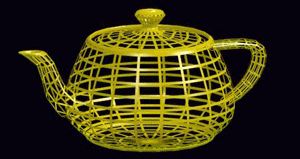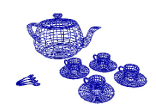 Back to Article
Back to Article
Tempest in aTeapot
The University of Utah may be renowned for its pioneering work in genetics and organ transplantation, but it’s also famous for creating a teapot.
In 1975, U researcher Martin Newell PhD’75 was knee-deep in a complex problem: how to get a computer to render 3-D objects—something that could appear reasonably realistic, and could be rotated and viewed from different angles? In the mid-’70s, it was a revolutionary idea, as the technology had yet to catch up with the imagination of computer scientists like Newell.
 Newell began searching for a test object, something he could attempt to recreate digitally. Newell’s wife suggested that he model a tea service—the pot, the cups and saucers, and the spoons. He initially made a sketch on graph paper, and then once back in the lab, began work to digitally re-create the tea set. The teapot itself was an ideal candidate for rendering, since its shape casts shadows on itself, and its form, while relatively simple, is composed of curves. Newell successfully worked out the mathematics required to generate the teapot, then proceeded to make his mathematical data available to others. Soon, computer scientists were building on Newell’s breakthrough technique, using his mathematical models as a foundation for creating ever more complex shapes. Newell began searching for a test object, something he could attempt to recreate digitally. Newell’s wife suggested that he model a tea service—the pot, the cups and saucers, and the spoons. He initially made a sketch on graph paper, and then once back in the lab, began work to digitally re-create the tea set. The teapot itself was an ideal candidate for rendering, since its shape casts shadows on itself, and its form, while relatively simple, is composed of curves. Newell successfully worked out the mathematics required to generate the teapot, then proceeded to make his mathematical data available to others. Soon, computer scientists were building on Newell’s breakthrough technique, using his mathematical models as a foundation for creating ever more complex shapes.
 The teapot has since come to symbolize complex, three-dimensional computer graphics. Computer scientists throughout the world are familiar with the “Utah teapot” and have worked the teapot into their own projects as an homage to—or an in-joke about, depending on who tells the story—Newell’s pioneering work. The teapot appears in many Pixar movies, including Toy Story; episodes of The Simpsons; and occasionally in the “pipes” screen saver that accompanies Microsoft Windows. The teapot has since come to symbolize complex, three-dimensional computer graphics. Computer scientists throughout the world are familiar with the “Utah teapot” and have worked the teapot into their own projects as an homage to—or an in-joke about, depending on who tells the story—Newell’s pioneering work. The teapot appears in many Pixar movies, including Toy Story; episodes of The Simpsons; and occasionally in the “pipes” screen saver that accompanies Microsoft Windows.
The actual teapot Newell used as his model is now in the Computer History Museum, located in Mountain View, Calif.
Return to article
Return to Winter 2006-07 table of contents
|

 Back to Article
Back to Article
 Newell began searching for a test object, something he could attempt to recreate digitally. Newell’s wife suggested that he model a tea service—the pot, the cups and saucers, and the spoons. He initially made a sketch on graph paper, and then once back in the lab, began work to digitally re-create the tea set. The teapot itself was an ideal candidate for rendering, since its shape casts shadows on itself, and its form, while relatively simple, is composed of curves. Newell successfully worked out the mathematics required to generate the teapot, then proceeded to make his mathematical data available to others. Soon, computer scientists were building on Newell’s breakthrough technique, using his mathematical models as a foundation for creating ever more complex shapes.
Newell began searching for a test object, something he could attempt to recreate digitally. Newell’s wife suggested that he model a tea service—the pot, the cups and saucers, and the spoons. He initially made a sketch on graph paper, and then once back in the lab, began work to digitally re-create the tea set. The teapot itself was an ideal candidate for rendering, since its shape casts shadows on itself, and its form, while relatively simple, is composed of curves. Newell successfully worked out the mathematics required to generate the teapot, then proceeded to make his mathematical data available to others. Soon, computer scientists were building on Newell’s breakthrough technique, using his mathematical models as a foundation for creating ever more complex shapes. The teapot has since come to symbolize complex, three-dimensional computer graphics. Computer scientists throughout the world are familiar with the “Utah teapot” and have worked the teapot into their own projects as an homage to—or an in-joke about, depending on who tells the story—Newell’s pioneering work. The teapot appears in many Pixar movies, including Toy Story; episodes of The Simpsons; and occasionally in the “pipes” screen saver that accompanies Microsoft Windows.
The teapot has since come to symbolize complex, three-dimensional computer graphics. Computer scientists throughout the world are familiar with the “Utah teapot” and have worked the teapot into their own projects as an homage to—or an in-joke about, depending on who tells the story—Newell’s pioneering work. The teapot appears in many Pixar movies, including Toy Story; episodes of The Simpsons; and occasionally in the “pipes” screen saver that accompanies Microsoft Windows.